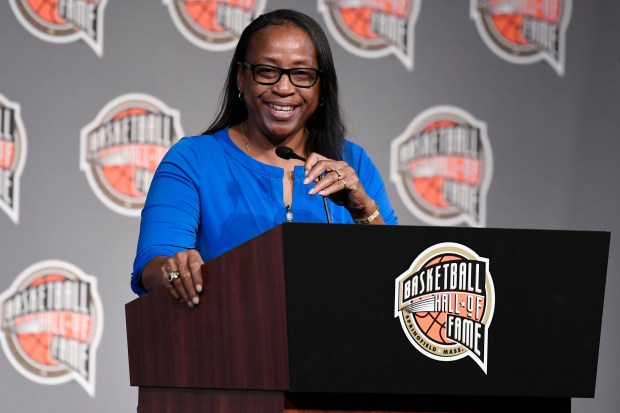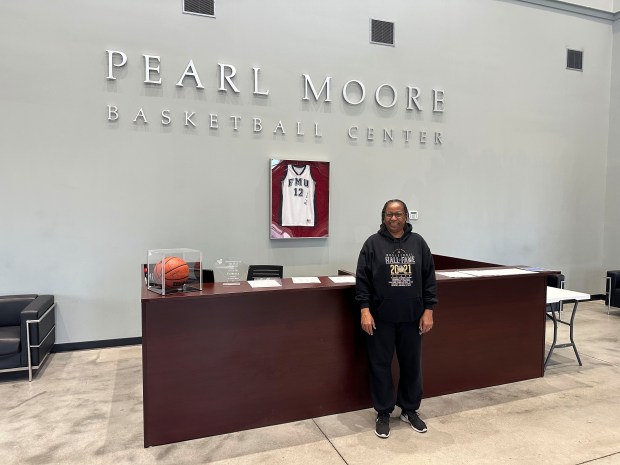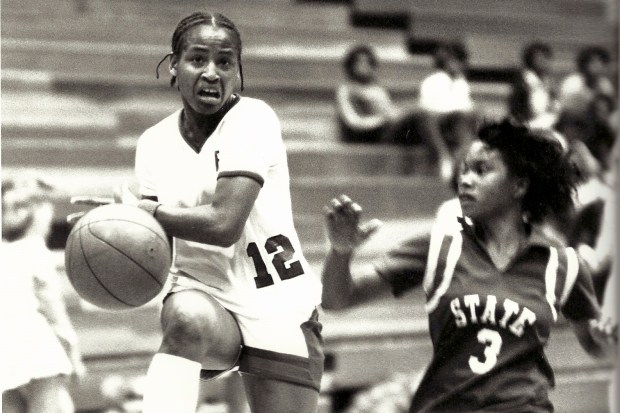FLORENCE, S.C. — Long before Iowa star Caitlin Clark hit her first long-range 3 or signed her first autograph, Pearl Moore set a scoring standard for women’s basketball that has stood for 45 years.
The soft-spoken woman from South Carolina led her team at Francis Marion to the postseason four years in a row, averaging more than 30 points every season. The 5-foot-7 guard once scored 60 points in a game.
She did it all under the radar in many ways, playing at a tiny school from 1975-79 when the Association for Intercollegiate Athletics for Women (AIAW) oversaw the sport. Her career points total — a staggering 4,061 — still stands as the overall record in women’s hoops and is unlikely to fall this season even if Clark and the Hawkeyes make another deep NCAA Tournament run.
The 66-year-old Moore is retired now, living in her hometown of Florence about a 90-minute drive from Columbia and the home of the top-ranked South Carolina program many believe will win the national championship this season. Iowa, which lost in the title game last season, is also among the favorites.
Moore will be watching. She has enjoyed following Clark’s run at the NCAA scoring record, amazed at her skill along with her composure in handling the demands of packed arenas and constant attention.
“She can lead her team, she can pass and she can score,” Moore said. “Those are three key components to being a great player.”
Moore’s journey to becoming the greatest scorer in the women’s game began in an era when women were not generally encouraged to play sports. But as part of a family of 11 children, there was always a game to join and she said she took to basketball because “there was something about that ball going through the hoop.”
And she could do that in bunches.
“I wanted to win and to do that, you had to score points, so I scored points,” Moore said during an interview courtside at the Pearl Moore Center in Florence.
Moore remembers getting just a couple of inquiries about playing college ball from schools in the AIAW, which at one point had more than 1,000 member schools.
She began her college career at Anderson Junior College, where she scored 177 points in eight games. Always a homebody, Moore came back to the Florence area to play for Francis Marion, now part of NCAA Division II. In those days, women’s basketball was largely the purview of the AIAW, which lasted until 1982, but Francis Marion was among the smaller schools by any measure.
Moore played for Sylvia Hatchell, who went on to win an NCAA championship with North Carolina. Hatchell wold marvel at Moore’s ability to get off shots. Hatchell said Moore would often wait for a defender to get close enough for contact before shooting and come away with the extra foul shots.
“She always said that,” Moore acknowledged. “But I just knew we had to get as many points as we could.”
Moore played professionally after college for the New York and St. Louis franchises of the old Women’s Professional Basketball League. She won a league title with the New York Stars her rookie season, playing sparsely attended games at the Felt Forum at Madison Square Garden.

Moore played a season overseas in Venezuela after the WPBL folded and won that league’s championship as well. She did not understand much of the language, except about her main objective.
“They kept yelling, ‘Lonza,’” Moore recalled, which means “ready for battle” and she interpreted as keep shooting.
After that season in 1982, Moore wanted to return to her hometown where she would hold youth basketball camps and work for the Postal Service. She was enshrined in the Women’s Basketball Hall of Fame in 2011 and the Naismith Basketball Hall of Fame 10 years later, with Hatchell as her presenter.
While Moore holds the overall record, former Kansas star Lynette Woodard holds the women’s major college basketball record with 3,649 points from 1978-81. Kelsey Plum set the women’s NCAA record after her four-year career at Washington (2013-17) and that total is the one Clark is set to pass this week to draw closer to Woodard and Moore.

South Carolina assistant coach Jolette Law grew up in Florence and played at the same high school as Moore, Wilson High. Law remembers how Moore played hard and was practically unguardable against women and men alike.
Moore coached Law at youth clinics and at high school practices, helping her get recruited to Iowa under C. Vivian Stringer. Law considers Moore a mentor and inspiration.
“To have someone like that help me learn the game was very special,” said Law, who was honored by her hometown when the court at the Pearl Moore Center was named for her.
Moore brushed off the notion of where she might rank into today’s game. Many of her shots, Francis Marion’s longtime media relations and marketing director affirmed, came beyond the 3-point line distance of 22 feet, 1 3/4 inches.
“I’m not the only one that affects,” she said. “Players like Lynette Woodard and Carol Blazejowski would’ve had bigger totals as well because of how we played.”
Blazejowski played at Montclair State in the mid-70s and finished with 3,199 points.
Moore said she is grateful for her accomplishments, content with her place in the game and she is happy for Clark.
“Just tell those (TV) analysts to make sure they call it right” as the NCAA scoring record, she quipped.




